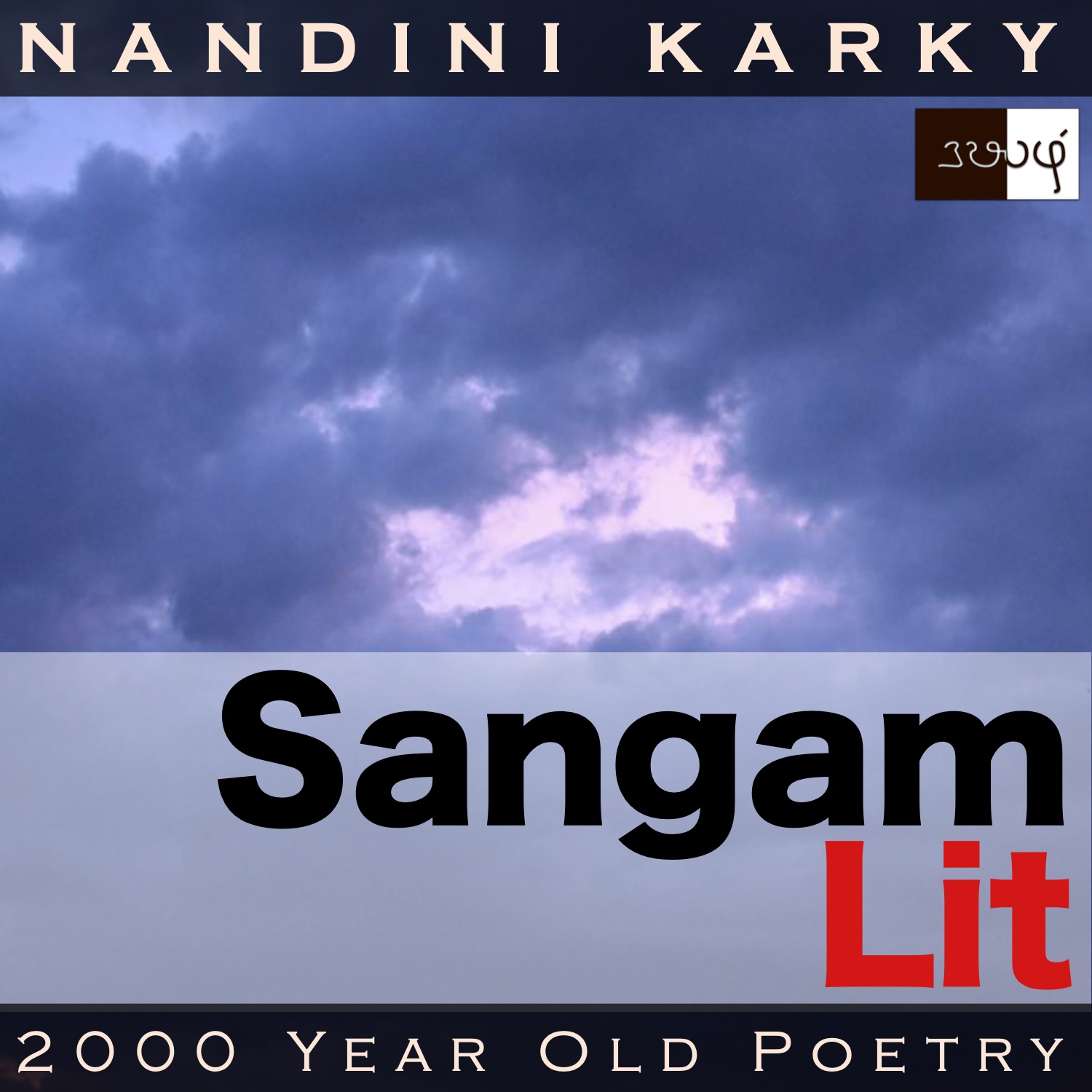Podcast: Play in new window | Download
Subscribe: Apple Podcasts | Spotify | Amazon Music | Android | iHeartRadio | TuneIn | RSS | More

In this episode, we perceive how nature influences inner life, as depicted in Sangam Literary work, Natrinai 112, written by Perunkundroor Kilaar. Set in the mountain country of ‘Kurinji’, the poem speaks in the comforting voice of the confidante to the lady, conveying a positive message about the man’s return.
விருந்து எவன்செய்கோ-தோழி!-சாரல்
அரும்பு அற மலர்ந்த கருங் கால் வேங்கைச்
சுரும்பு இமிர் அடுக்கம் புலம்பக் களிறு அட்டு,
உரும்பு இல் உள்ளத்து அரிமா வழங்கும்
பெருங் கல் நாடன் வரவு அறிந்து, விரும்பி,
மாக் கடல் முகந்து, மணி நிறத்து அருவித்
தாழ் நீர் நனந் தலை அழுந்து படப் பாஅய்,
மலை இமைப்பது போல் மின்னி,
சிலை வல் ஏற்றொடு செறிந்த இம் மழைக்கே?
Beginning with the phrase, ‘விருந்து எவன்செய்கோ’ meaning ‘what shall we spread as a feast?’, the poem seems to welcome us with ancient Tamil hospitality. Words like ‘சாரல்’ meaning ‘slope’, ‘அடுக்கம்’ meaning ‘ranges’ and ‘பெருங் கல்’ meaning ‘huge rocks’ bring before our eyes, a mountain land. Shading our imagination further, appear the ‘வேங்கை’ or ‘Indian Kino tree’ and the ‘அரிமா’ or ‘lion’. The verse informs us that to see a lion in India two thousand years ago, one need not travel to a little corner in the Gir region of Gujarat, but rather they could be seen even in the very south of the subcontinent. Smiled to find a new meaning for the word ‘சிலை’, which is commonly used to refer to a ‘statue’, to mean ‘noise’ here! Wonder who could be making all that noise? Let’s trek to the mountain country to investigate!
The man and woman have been in a married relationship and the man parts from the lady to gather wealth for the family. When he leaves, he promises that he will be back by the rainy season. The lady languishes, sensing that the rains have come but not her love. So, the confidante turns to her and says, “On the mountain slope, the dark-trunked ‘vengai’ tree is in full bloom. Making those bee-buzzing mountain ranges lament, there roams a lion with a fearless heart, after killing an elephant. Such is the country of our lord of the high mountains. Knowing of his return, with affection, dipping into dark seas, making sapphire-hued cascades flow down towards empty pits so as to hide the land beneath, flashing lightning down as if the hills are winking, descending as thunder with a powerful noise, pours the rain. What feast shall we spread for this rain, O friend?” With these words, the confidante interprets that the rains are actually here to herald the arrival of the man and thus, brings cheer and hope to the lady.
Exploring this land further, we first stand and gaze at the ‘vengai’ tree, blooming bright, with not a bud left out. As we take in the sight of this tree with bright, yellow flowers, reminding one of a tiger, we hear the sounds of bees buzzing and see the entire mountain country shake with fear as a lion kills an elephant. The confidante describes the mountain country of the man with these words and also hides within, a metaphor speaking of how the man, with the fearless heart like that of the lion, will end the elephant-like disease of pining in the lady. The confidante then turns her attention to the rains, which she describes as a sentient thing that learns in advance about the man’s arrival. Though it’s not yet time, the clouds rush to drink from the dark seas. Sangam poets have got their concepts of evaporation right, for sure! Then drinking from the dark seas, they pour as rain, making sapphire-coloured cascades flow and fall. The phrase ‘தாழ் நீர்’ speaks of the nature of water to flow down, seeking low-lying places, so as to fill them up. If the nature of ‘fire’ is always to rise up, the counter element keeps the balance by flowing down.The magic of nature, indeed! The rains don’t stop with the waterfalls, for they descend as lightning and seem to make the mountains blink or wink, depending on your sense of humour. When light is here, can sound be far behind? We hear the powerful roaring of thunder that seems to give the finishing touch to this adorable element of nature, the rain!
And now, we understand that the feast the confidante was talking about, was meant for the rain! Why because, the sole purpose of all the light and sound show by the rains is to tell them that the man is on his way to the lady. So says the confidante, cheering the lady and conveying the news of the man’s imminent return and declares that they must plan a feast for this kind rain. What a delightful thought to offer a feast for the one that’s a feast for all life!




Share your thoughts...